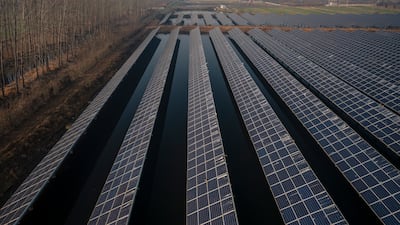Chinese solar panel manufacturer Trinasolar is seeking the “right partner” for its plan to set up a $5 billion integrated solar power generation chain in the UAE, a senior executive said.
Katherine Gao, the company's co-chairwoman, first revealed the project in a 2023 interview with the state news agency Wam during the Cop28 climate conference in Dubai. It was reported at the time that the initiative would create jobs for more than 7,000 people.
“The only thing is about when and how … from a government level, the UAE has a very ambitious target for the solar plan in the future, so this is an amazing market,” said Vincent Wu, president and head of Trinasolar Middle East and Africa region.
“From Trinasolar’s side, we are looking for the right partner and also whether we want to access local resources,” he told The National on the sidelines of the World Future Energy Summit. “We have a dedicated team who are working on [the project] daily”
Mr Wu expects the solar energy market in the Middle East to mature within the next three to five years as more industry suppliers establish a presence in the region.
Trinasolar, which is one of the world's biggest solar panel makers by sales, is also encouraging its suppliers to enter the Middle East, the executive said.
“It's about the local resources, like human resources, [and] the [level of] inflation. It's also about the supply chain, because the solar business is not only about modules and [battery storage],” he said.

While Trinasolar explores setting up manufacturing hubs in the region, the company is focusing on the sales of modules and services in the Middle East and Africa.
“We have our sales office in Dubai, [and] we have sub offices in Saudi Arabia, South Africa and Algeria. So, from a sales point of view, we are investing a lot,” Mr Wu said.
Trinasolar recently partnered with the UAE's Amea Power to supply its energy storage system for a major solar project in Egypt, marking its first energy storage initiative in the region.
Egypt, the Arab world's third-largest economy, has “big potential”, thanks to a “stable” political environment and a large population, Mr Wu said.
Impact of tariffs
Chinese companies dominate the global photovoltaic (PV) industry, accounting for more than 80 per cent of the market share.
However, this dominance has faced some challenges from international trade restrictions. Since 2012, numerous countries, including major economies such as the US and Europe, have repeatedly imposed anti-dumping and countervailing duties on Chinese PV imports.
Concerns have also been raised about the increasing number of Chinese companies relocating production to South-East Asia to bypass US tariffs.
US president-elect Donald Trump, who often takes an adversarial view of China and Chinese companies, plans to raise tariffs by an additional 10 per cent on all Chinese goods coming into America.
Mr Wu said that Trinasolar is adapting to existing tariffs by decentralising its manufacturing and added that the new tariffs under the US administration “will not be a big issue”.
“If you know the solar industry from the very beginning, tariffs are not something new. It's actually a daily business.”

